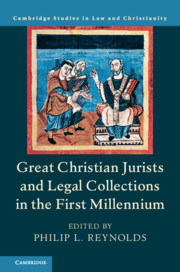Book contents
- Great Christian Jurists and Legal Collections in the First Millennium
- Law and Christianity
- Great Christian Jurists and Legal Collections in the First Millennium
- Copyright page
- Contents
- Contributors
- Preface and Acknowledgments
- Abbreviations
- Part I
- 1 Normative Texts and Practices of the First Millennium
- 2 The Many Voices of Roman Law
- 3 The Law of the Post-Roman Kingdoms
- 4 Ecclesiastical Councils
- 5 The Papacy
- 6 The Sacred Palace, Public Penance, and the Carolingian Polity1
- 7 Canonical Collections
- 8 The Practice and Literature of Penance
- 9 Monastic Rules
- Part II
- Index
- References
4 - Ecclesiastical Councils
from Part I
Published online by Cambridge University Press: 21 June 2019
- Great Christian Jurists and Legal Collections in the First Millennium
- Law and Christianity
- Great Christian Jurists and Legal Collections in the First Millennium
- Copyright page
- Contents
- Contributors
- Preface and Acknowledgments
- Abbreviations
- Part I
- 1 Normative Texts and Practices of the First Millennium
- 2 The Many Voices of Roman Law
- 3 The Law of the Post-Roman Kingdoms
- 4 Ecclesiastical Councils
- 5 The Papacy
- 6 The Sacred Palace, Public Penance, and the Carolingian Polity1
- 7 Canonical Collections
- 8 The Practice and Literature of Penance
- 9 Monastic Rules
- Part II
- Index
- References
Summary
The history of conciliarism during the first millennium is also the story of episcopal corporatism. During this period, hundreds of episcopal councils assembled throughout the Latin West. Primarily regional meetings, these defy easy generalizations as regards their priorities and agendas and their influence on religious policy and practice. Despite their diversity, however, they constituted an institutional mechanism for bishops to craft rules whose authority was predicated chiefly on the consensus of the bishops as legislators. Collectively, bishops contributed to a growing body of ecclesiastical norms, which had yet to be fully delineated or codified. While promulgating policies for their immediate context, bishops consciously grounded their work in authoritative precedent, reaffirming both their shared corporate identity and authority and their role in the continuation of the apostolic tradition.
Keywords
- Type
- Chapter
- Information
- Publisher: Cambridge University PressPrint publication year: 2019

